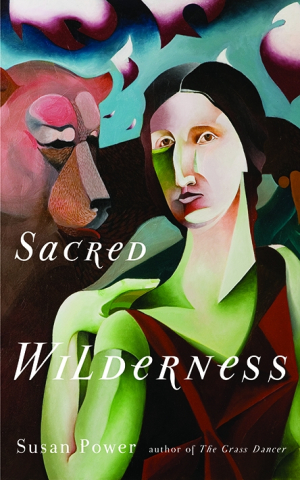Sacred Wilderness
Power’s prose reflects the magic in her narrative.
Don’t say that Susan Power uses magical realism. This would suggest that the fictional world she presents is an alternate reality, not a real part of everyday experience. However, magic exists in Sacred Wilderness. Protagonist Candace encounters native guides—with the help of Gladys, her “housekeeper”; Maryam, the spirit of the mother of Jesus; and a mask that embodies Mohawk history—and she learns to embrace her personal and tribal history and culture.
Candace, a wealthy socialite who is out of touch with her husband, fills her empty days with activities. She owns a collection of native art and keeps it in a closed room, just as she keeps her Mohawk identity closed off from the rest of her personality. When Candace finally learns the stories of her ancestors and parents, she begins to understand herself.
Oral storytelling is a significant part of the author’s technique. Candace’s father-in-law, Jules, tells of meeting John Dillinger. Gladys talks about her ancestors, the curious Dakota, and the stubborn Ojibwe woman. The transcript of an anthropologist’s interview with Ruby Two-Axe completes Candace’s re-education. These stories are both entertaining and instructive for characters and reader, though, at points, the instructive purpose of the larger narrative nearly overpowers its entertainment quality. Power identifies numerous native authors and their books. A scene in a bookstore allows LeAnne Howe to speak at length about her book on how Native Americans invented baseball. These moments read more like interruptions than continuations of the story.
After Candace is reconciled with her haunting past—and her husband—the story continues, and all conflicts are resolved. Couples find their proper mates, as in a Shakespearean romance. The magical qualities of the narrative would seem more natural if there were a balance of conventional reality in other parts of the story.
The best magic in the story is the language. A story travels quickly because “tongues move faster than feet.” Gladys explains that her third husband had “fish luck” when he “hauled her in.” Maryam has eyes like “dark melted honey.” A character walking in the fog wears “clouds like leggings.”
Susan Power understands the importance of magic in stories and her life: she tells of being visited by the spirit of a Dakota Sioux woman, after which she abandoned her law career to pursue writing. In 1995, she received the PEN/Hemingway Award for The Grass Dancer. Her short fiction has appeared in Atlantic Monthly and Paris Review and has been anthologized. She teaches at Hamline University in St. Paul, Minnesota.
Reviewed by
Geraldine Richards
Disclosure: This article is not an endorsement, but a review. The publisher of this book provided free copies of the book to have their book reviewed by a professional reviewer. No fee was paid by the publisher for this review. Foreword Reviews only recommends books that we love. Foreword Magazine, Inc. is disclosing this in accordance with the Federal Trade Commission’s 16 CFR, Part 255.

